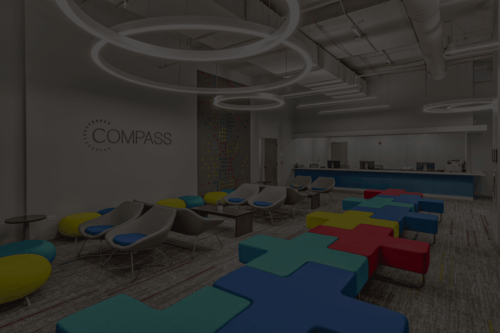Depression
Compass Health Center’s treatment teams provide patient-centered, high-level behavioral health care and crisis support for children, adolescents, young adults, and adults with Depression. The priority of Compass's comprehensive, individualized treatment plans is to help patients build the necessary skills needed to succeed in their daily lives as quickly as possible.
Schedule an Appointment Why Treatment Length Matters - Compass Health Center
">
- Compass Health Center
">
What Is Depression?
The World Health Organization (WHO) reports that 300 million people globally have Depression. Depression is a mood disorder that causes a constant feeling of sadness and loss of interest in day-to-day activities. Also referred to as Major Depressive Disorder (MDD) or Clinical Depression, this disorder affects how individuals feel and behave—both mentally and physically.
Sadness is considered a normal reaction to loss or certain life challenges. However, when sadness turns into intense symptoms that disrupt daily functioning, it could be an indication of Clinical Depression.
MDD is one of the most common mental health diagnoses across age groups. It is estimated that 16.2 million adults in the United States —roughly 6.7%— have at least one Major Depressive Episode (MDE) per year. Depression is the leading cause of disability in the United States for people ages 15 to 44, and is more prevalent in women than in men. Depression symptoms vary, which is why treatment at Compass Health Center is individualized to meet the specific needs of each patient.
The most common and diagnosed types of Depression include:
- Major Depressive Disorder
- Persistent Depressive Disorder
- Bipolar Disorder
- Seasonal Depression
- Postpartum Depression
- Psychotic Depression

Common Depression Symptoms
According to the Diagnostic and Statistical Manual of Mental Disorders, an individual may be experiencing MDD when they have five or more of the following Depression symptoms for at least two weeks:
- A feeling of overwhelming sadness upon waking, which continues throughout the day
- A feeling of tiredness or lack of energy
- Daily feelings of worthlessness or guilt
- A constant feeling of hopelessness or pessimism
- Difficulty concentrating, remembering details, or making decisions
- Difficulty sleeping or excessive sleeping
- Lack of interest or pleasure in many activities
- Recurring thoughts of suicide or death
- Drastic weight gain or weight loss due to unhealthy eating patterns
- Restless feelings
- Feeling irritable or “cranky”
- Loss of an overall pleasure in living life
- Aches, pains, cramps, headaches, or digestive problems
- Anxious and “empty” feelings
- Fixation on the past, on past mistakes, or on things that have “gone wrong”
While the occurrence of these symptoms is common for those with MDD, not everyone will experience symptoms the same way. The effects of Depression can vary from person to person, with intensity ranging from mild to debilitating. It is encouraged to seek medical advice to gain a proper diagnosis.

When to Seek Treatment for Depression
While sadness is a normal feeling that every person feels at some point in their lives, if symptoms reach a point when they interfere with daily functioning or present consistently for two weeks or more it is important to seek professional, evidence-based treatment.
Depression in Children and Teens
Depression and Anxiety are among the most common mental health concerns in children and adolescents. Symptoms can affect the way they learn, behave, or handle emotions, potentially causing problems in their daily life. According to the CDC, approximately 1.9 million children ages 6 to 12 in the United States have diagnosed Depression. Research shows that around 25% of teens experience Depression. While Depression is one of the leading mental health diagnoses among teens, most cases are left undetected and untreated; 60% of children and adolescents with Depression are not getting any kind of professional treatment.
Depression in Young Adults and Adults
According to the CDC, Depression is one of the leading causes of disability among adults in the United States. Nearly 50% of all adults diagnosed with Depression are also found to have a co-occurring Anxiety Disorder.
Up to 15% of adults and young adults suffer from Depression symptoms at any given time, and only 30% of young adults with depression are being treated. Individuals aged 18 to 29 experience symptoms of Depression the most (21%), followed by adults aged 45 to 64 years old.
AREAS OF FOCUS
Didn’t find what you are looking for? Click here to contact Compass.









